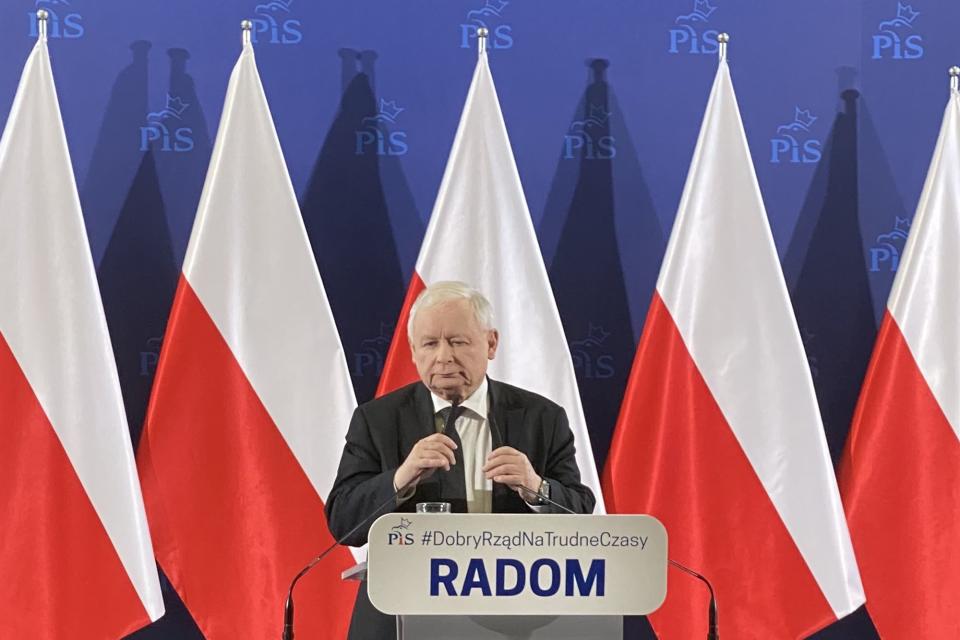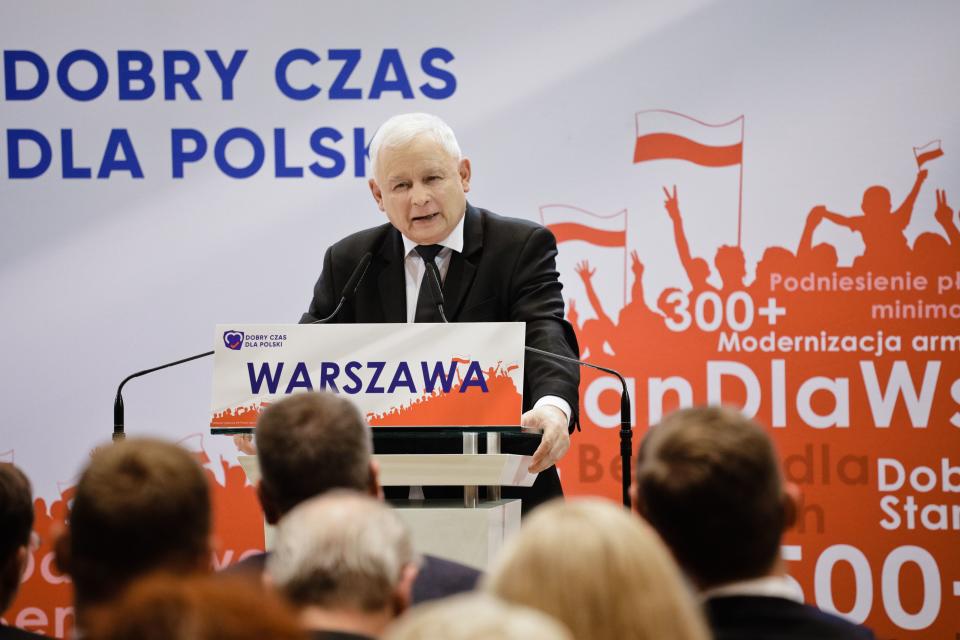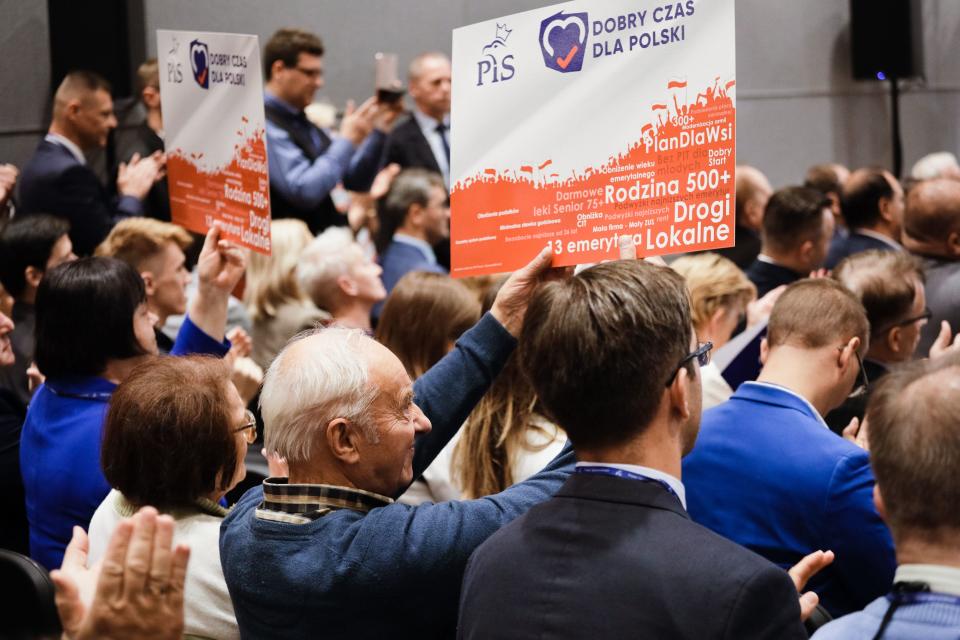Germany Is the New Enemy in Polish Leader’s Fight to Keep Power
- Oops!Something went wrong.Please try again later.
- Oops!Something went wrong.Please try again later.
(Bloomberg) -- Against a backdrop of half a dozen red-and-white Polish flags, Jaroslaw Kaczynski didn’t take long to rouse supporters against what he said was the gravest threat to their country’s future.
Most Read from Bloomberg
Lawyer Suing Twitter Over Layoffs Says Musk Trying to Comply
Musk Eliminates ‘Days of Rest’ From Twitter Employee Calendars
Twitter Latest: Civil Rights Groups to Boost Advertiser Pressure
Blackstone’s $70 Billion Real Estate Fund for Retail Investors Is Losing Steam
But rather than Russia as Vladimir Putin escalates his war in Ukraine or the record inflation eating into household budgets, Poland’s most powerful politician laid into a European Union ally: it’s Germany people should worry about, he told the 150 or so guests as they nodded in approval.
To the outside world, Poland’s western neighbor is its biggest financial benefactor through billions of euros of European aid and investment and its largest trading partner. To Kaczynski and his ruling nationalist Law & Justice party, Germany is the latest convenient enemy as their popularity wanes a year before an election whose outcome could prove critical to EU unity.
Law & Justice has painted itself as the defender of Polish conservative Catholic values in a continent dominated by Brussels, Paris and Berlin. It’s targeted “liberal elites,” Muslim refugees, the LGBTQ community and women’s rights since coming to power after a landslide victory in 2015 and has mired Poland in a dispute with the EU over the erosion of rule of law.
Now with Donald Tusk, a former president of the European Council, leading the main opposition party again, Kaczynski is carving out a new line of attack, depicting his archrival as a puppet of Germany.
State-controlled media has flooded viewers with images of Tusk speaking German or quoting him praising former Chancellor Angela Merkel. The headline on a recent evening news bulletin warned that Germans wanted to take coal for heating from Polish homes.
“We have one Polish party, and we have a German party,” Kaczynski, 73, said on Oct. 26 in his address in a compact university auditorium in Radom, about an hour’s drive south of Warsaw. “This is a choice we are facing now. This is a choice that will decide on the fate of our country.” After the dominance of the Soviet Union, Poland risked coming under Germany’s “yoke,” he said.
The centerpiece of Law & Justice’s effort is a demand that Germany pay $1.3 trillion in compensation for wartime damage — a sum equivalent to twice Poland’s gross domestic product. Unveiled at an ornate ceremony at Warsaw’s Royal Castle on Sept. 1 — the 83rd anniversary of the start of the war — the bill is comprehensively detailed in three volumes, albeit not yet in German.
German Chancellor Olaf Scholz has dismissed the claim reinforcing Berlin’s position that war claims have been long settled. “There is always room for dialog between Berlin and Warsaw, but the Polish way of presenting new bills for old wounds does not really lead in that direction,” Thomas Bagger, Germany’s ambassador to Poland, said in an interview in Warsaw. “It’s a path to nowhere.”
Tusk, who is seeking a return to Poland’s premiership after serving as prime minister from 2007 until he took his job in Brussels in 2014, said Kaczynski was simply electioneering. “Kaczynski is open about the fact that he wants to use this anti-German campaign to build support for the ruling party,” Tusk said when the reparations report was unveiled.
That’s backed up by relations between the two countries away from the politics. Energy talks are cordial behind closed doors, according to two senior German officials. Detailed negotiations on securing oil supplies through Poland to Germany’s refinery on the Polish border to replace Russian imports are expected to be wrapped up by the end of the year.
Kaczynski’s anti-German playbook, meanwhile, is a way to stir the grassroots because it resonates more than attacking the EU, according to Aleks Szczerbiak, professor of politics at the University of Sussex in the UK. Indeed, memories of the destruction wrought by the Nazis in World War II are still alive in Poland.
Under Kaczynski as leader and Prime Minister Mateusz Morawiecki, Law & Justice has maintained its hold over Polish politics with conservative social policies backed by the Catholic Church and generous welfare payouts for families and seniors. They have tapped into the discontent among ordinary Poles left behind during Tusk’s premiership and benefited from a splintered opposition.
But polls show its grip may be slipping. An Oct. 14-19 survey by Kantar put Law & Justice on 28% support, three percentage points behind a coalition led by Tusk’s Civic Platform. That’s as Brussels withholds 35.4 billion euros ($35.1 billion) in post-pandemic aid to Poland and the EU’s top court is fining the nation 1 million euros a day over its mechanism to discipline judges.
With Poles confronting soaring energy prices and a shortage of coal that’s forcing many to burn trash this winter, the fighting talk has an appeal. A recent study by German Marshall Fund showed the perception of Germany’s reliability dropped in Poland by 15 percentage points, the most among 14 countries taking part in the survey.
Beata Durzinska, 50, a worker at city hall in Radom who attended Kaczynski’s rally, said she backs his demand that Germany pay, though she’s not a Law & Justice member. “I do support the reparation claims, because during the war it was Poland that suffered the most,” she said.
Law & Justice also has other channels to reinforce its campaign. Central bank Governor Adam Glapinski, a Kaczynski ally, said that Germany’s push for Poland to join the euro was part of territorial ambitions for lands lost after 1945.
How Tusk responds in coming months will be key as the governing party sets “traps” for Civic Platform to come across as the defender of German interests, Szczerbiak, the politics professor, wrote in a blog post published on Oct. 18.
In a vote in parliament, all but four lawmakers from Tusk’s party backed a resolution calling on Germany to take financial responsibility for the consequences of World War II.
The reparations issue “is a highly emotive one and seen by Law & Justice primarily as an effective way of solidifying and mobilizing its own, currently rather demotivated, electoral base,” Szczerbiak said.
--With assistance from Piotr Skolimowski.
Most Read from Bloomberg Businessweek
Yeezy Roller Coaster Ended With Two-Minute Phone Call at Adidas
El Salvador’s $300 Million Bitcoin ‘Revolution’ Is Failing Miserably
Fast Fashion Waste Is Choking Developing Countries With Mountains of Trash
US Housing Hit by Spiraling Mortgage Rates as Inflation Persists
These Five Women Are Helping Doctors Crack the Long-Covid Mystery
©2022 Bloomberg L.P.




